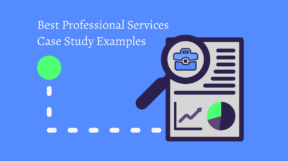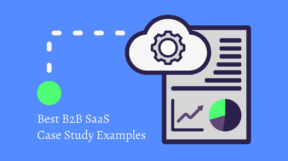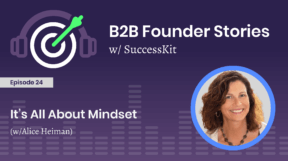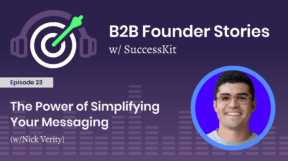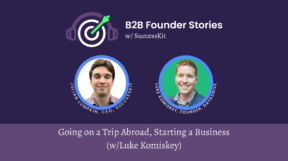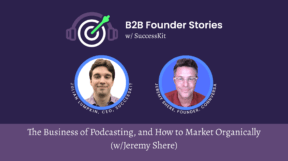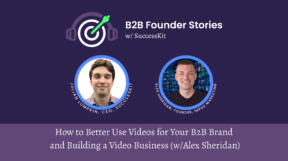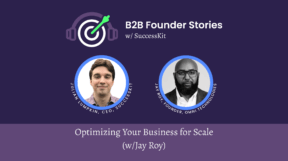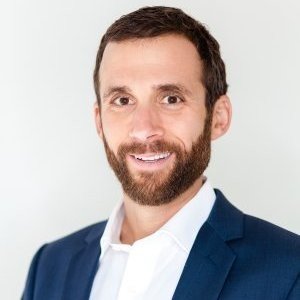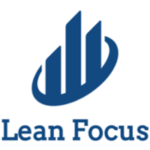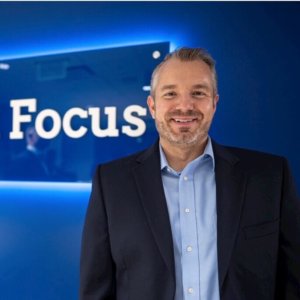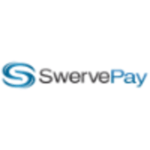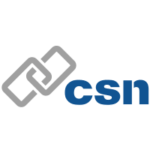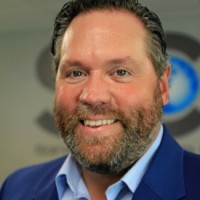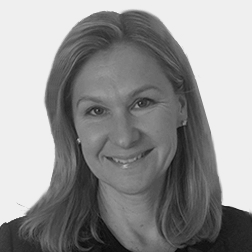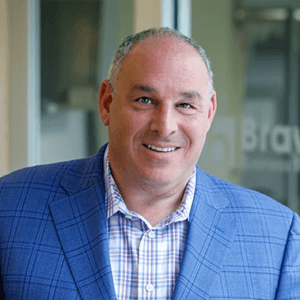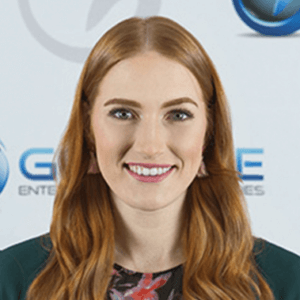Listen to this episode now on Spotify or Apple!
The tenth episode of our B2B Founder Stories podcast features the founder of eMojo Digital Solutions, Omer Menashe, who has created several businesses, including an Israeli company that became one of the biggest leaders in app development education. He describes how he turned a fun, two-person digital marketing operation into a real business with seventeen employees and brought in a CEO to take over when he moved from Israel to New York City. He also explains how he evaluates saying yes to clients requesting a service that isn’t yet offered and identifies the characteristics of a good new opportunity.
“[As an aspiring entrpreneur,] assume you’re going to fail a lot. That doesn’t mean you’re not going to succeed in the future, but it’s highly likely that most of your attempts are going to be failures. Mine were, for sure, and I’m sure that if I do more things, then I’ll fail even more. It doesn’t even matter how much past success you’ve had. If you’re considering starting a business but you’re afraid it might not work, then I’m telling you right here and now it probably won’t work and you’ll have to move to the next [idea]. But you’ll never do that unless you fail once or twice—or five or ten times—before.”
Omer Menashe, Founder of eMojo Digital Solutions
Transcript of Podcast Episode 10: Turning a Passion Project into a Real Business (w/Omer Menashe, Founder of eMojo Digital Solutions)
Julian Lumpkin: Welcome back to B2B Founder Stories w/ SuccessKit. As a reminder, if you or anyone you know needs help with Case Studies or Video Testimonials, find us at successkit.io to see how we create them for our clients. In this episode of the podcast, I interview Omer Menashe. He’s the founder of eMojo and is involved with some other companies, as we discuss. In this interview, we go through his journey from moving from Israel to New York City, and the process of starting a new company while running his existing company. I hope you enjoy the episode. Omer, thanks for joining me.
Omer Menashe: Thanks for having me, Julian.
Julian Lumpkin: So, to begin, tell us a little bit about eMojo Digital, when and where you started it, and where you are now with that company.
Omer Menashe: Sure. So, I’ll start with the previous company, actually, called Inspire Mobile, which was an iPhone and Android development shop that did a lot of course instruction as well. It was an Israeli company, and it quickly became one of the biggest leaders in app development education. And so, we’ve partnered with one of the biggest colleges in Israel—technical colleges—called the Ness College, and we were basically teaching their courses all throughout Israel.
Omer Menashe: I sold that company after learning quite a bit about marketing, managing a business, running a business, entrepreneurship, and all of that. And I started eMojo, which was meant to be and has since become a full-scale digital marketing agency offering end-to-end solutions to companies. Now, we have gravitated towards the world of startup, tech, a lot of e-commerce—these are the main client core that we have, and we’re trying to offer the full suite of services that they might need. So, anything from creative development, to online assets, websites, videos, creatives of all kinds, all through what we really like and are good at, which is growth and penetration strategy, and then the implementation through various tactics like SEO and performance campaigns, automation, content marketing, and all that.
Julian Lumpkin: Nice. And if I remember correctly, you started the company about 10 years ago and you were in Israel. So, tell us about starting the company there and ultimately the decision to come to New York.
Omer Menashe: So, I did start the company about 10 years ago with my partner, Shay. Started out as a two-person shop, tiny room, sitting back to back, offering just the core services, which is PPC, paid campaign management, and SEO. It was honestly just a lot of fun. We didn’t think about it as starting a company or starting anything big. We just teamed up because it was a good fit, and we just went to work. He brought in a couple clients. I brought in a couple clients. And I like to say that we did a good job and grew organically, but obviously, there’s a luck element to it as well. But we did grow, and today we are 17 people in the office in Tel Aviv. I, myself, am in New York. We’re looking to grow in New York as well. And we’re even considering an office in Dubai because we have a bit of activity starting up there.
Julian Lumpkin: Tell me, if you would, about the transition from two people just doing something you like and are good at, to we’re going to start to grow this and build a company. How did that happen? What led to it, and why did it go that direction?
Omer Menashe: So, I mean, obviously getting to that first employee, that was the biggest leap, because it took a big chunk of what we kept, what we earned. And I think that was probably the best decision, and maybe where a lot of really small businesses are struggling to make that leap. Because I mean, nobody starts a business to manage employees. That’s never the goal, or that’s rarely the goal, I guess—maybe some people just love managing people for the sake of it. But we started the business because we thought we did good in digital marketing. We thought we had value to provide. And we didn’t really want another person to manage and keep track of, and we knew the quality of the work we were providing. But once you start working with employees, you have a lot of checks and balances that you have to take care of.
Omer Menashe: And so, I’m fondly remembering that period, because I realize how much we didn’t know. But at the end of the day, hiring employees was the absolute right move, obviously, and it’s the only way to grow. And once we’ve made that leap, it was also right around the time where we managed to rank for number one for the Hebrew search query of organic search, or SEO, or the translation of that search query in Hebrew. And that brought us a ton of business.
Omer Menashe: And so, we knew we couldn’t field that business all by ourselves, and we needed someone. Now, we didn’t even take the high road about it. We weren’t mature about it. It’s not like we said, “All right. We’re going to bite the bullet. We’re going to hire someone full-time; it’s going to be the healthy process that you read about in the books.” No, we tried doing it with freelancers in the beginning, and then we hired someone part-time, and then someone 80 percent of a position’s worth. And only at that point we realized, listen, this isn’t working. Either we’re in, or we’re out. We can’t be half wet. So, we ended up being fully wet, and I mean, the rest is history. We’ve grown quite a bit since then.
Julian Lumpkin: Nice. Yeah. Those of my audience who know about my own story with SuccessKit know that I had a similar transition of doing things on my own for a while, and then finally getting to that stage of bringing in employees. And I think people don’t realize how difficult that process is when either you’re delivering creative work, and you’re bootstrapped that full-time, your first full-time employee or two is a very difficult transition for any company. But so, today you’re 17 people. Things are starting to grow. I’m curious, and we don’t have to go too deep into it, but what’s the makeup of the team of those 17 people? Are they all creative marketers? Are there some sales reps in there? What’s the makeup of the team now?
Omer Menashe: So, we do have an in-house studio, rather small, it’s two people. Virtually everyone else are flavors of performance marketers, so SEO, PPC, content, outreach, that sort of thing. We actually don’t have anyone officially filling a sales function as a title. A lot of it is done by myself or the current CEO. But I think what makes eMojo special is that we rarely go out and hunt our own clients, so to speak. Ninety-nine point nine percent of our clients—of our revenue—comes from referrals, from just word of mouth. Do a good job, and you just get business that way. That’s what we believe.
Julian Lumpkin: Nice. So, you mentioned having a CEO and I want to talk about that. Can you tell us when, well, first of all, yeah, when did you bring in a CEO to take over at eMojo?
Omer Menashe: So, that was when I relocated to New York, basically. I knew I couldn’t manage the company with the seven-hour difference that Tel Aviv and New York have, and so it was very clear that I needed someone here for the day-to-day management.
Julian Lumpkin: Yeah. And that’s a really tough transition. Can you tell us about going through that and how you approached finding someone, or is it an internal promotion? How did you find a CEO for the company?
Omer Menashe: So, as I had mentioned, eMojo was started by two people, myself and my partner, Shay. I was always the person actively managing the outward functions of the business. And so, when I was gone, or about to be gone, it was clear that we needed someone to replace—to do that job, basically. And Shay just knew a guy who knew a guy. Eitan, our current CEO, is I think one of three people that we met total. We hired an organizational consultant slash psychologist type function to help us analyze what we need, what that person is, what the business needs. But frankly, I mean, I wish I could provide more value and insight through the process, but I think we were just incredibly lucky to find the right person at the right time. That really is what it was.
Julian Lumpkin: Nice. And tell me about how the transition has went—what was it like giving up the CEO control to someone else? How did the team and how did your clients respond?
Omer Menashe: So, two years prior to me officially relocating, I think I was already mentally ready to let go of the reins. I don’t think I ever really wanted to manage a service-based business to the extent that I did. I think we’ve all done a great job building eMojo into what it was, but I mean, if you ask me what do I want to do when I’m 50, when I’m 60, it’s not answering clients’ emails, and fielding calls, and talk about the service aspect of digital marketing. I’m still fascinated by digital marketing, by how to get to the things that the clients need, but managing a service-based business is super intensive, emotional. That there’s a lot of things going into that. And I think eight, nine years in, I was ready to move on.
Omer Menashe: So, mentally, not a problem at all. I was actually pretty excited. In terms of how it went, pretty smoothly. I mean, we started out introducing the person as a COO, so that it’s a smoother transition than just saying, “Hey guys, as of tomorrow, there’s a new CEO.” And I was still there, I think, for the first couple of months. So, we did an overlap period, but again, I mean to Eitan’s credit, he managed it beautifully and he took charge just the way we hoped he would.
Julian Lumpkin: What signs did you see within your company that told you the company was ready for you to transition away from the CEO role?
Omer Menashe: So, I don’t think that’s what I actually saw. I think me transitioning away from the CEO role is more something that I wanted. But eMojo’s been growing very steadily year over year. The reason why we got to the point where I relocated and needed a CEO, is because we’re Israelis. So, there are a lot of Israelis spread out around the world. We kept getting international business just by virtue of being Israelis, and international Israelis wanting to work with local Israelis, essentially. So, that means a person in Stockholm works with some tech company. He wants to work with Israelis, so we source his help here. Same with the guy in Berlin, same with the guy in New York, and obviously everywhere else. And so, we realized about five years in that we’re getting all this international business without really trying.
Omer Menashe: And it was amazing. I mean, they pay more. They are better with paying on time. They understand processes better. It’s just better all around on pretty much every aspect. And so, at that point, my partner and I have decided that we need to actively pursue this, because if we’re getting all this business by existing, if we actually put some effort into it, we’ll definitely benefit. And so, at that point, we had two main client hubs. One was in Sydney, one was in New York. New York is a way closer flight than Sydney, and we just started booking flights to New York.
Omer Menashe: And I would go to the city every month and a half, let’s say between a month and a month and a half. Be there for seven to 10 days. Try to have meetings booked morning to evening, and come home exhausted, but generally with a few new clients and few tightened relationships with existing clients. And that just kept growing, growing, grow. So, I mean, that’s a long way to answer the question, but it’s not that the company was ready for me transitioning out. It’s more that the company was just growing in an unexpected direction.
Julian Lumpkin: That’s really interesting. We do tend to think of these transitions is all about company stages, but as the founder of the company, sometimes you get to or have to make decisions based on the lifestyle and what the company is asking from you, and getting to make that decision. So, it’s great you got to a point where you were able to make a decision that supported what you wanted to do as the founder. And as I understand it, since making that transition, you’ve started a new company. Tell us a little bit about that.
Omer Menashe: Right. And just to wrap up the eMojo part, I would say that the way things have turned out is exactly the way we’ve started eMojo and how we ran eMojo the first eight years. Every time someone would come in and ask if we offer a certain service, then we would first say, “Yes, of course we do. We offer that service,” and then we would find someone who knows how to offer the service and play middlemen until we learn how to do it and it became a core service. And I mean, it’s exactly what happened with the states. We realized we’re getting good business. We had no idea how to penetrate the US market ourselves, but I just got on a plane, asked all of my friends to introduce me to anyone who literally breathes oxygen in New York that they know, so I can have coffee meetings with them. And it just kept growing and growing. So, it’s just that mindset, I think, that we’ve always had at eMojo. Let’s try and let’s see what happens, and generally, it works out. Lucky for us, I guess.
Julian Lumpkin: Actually, before we transition to the other company, I want to ask about that because it’s a topic I’m interested in. So, what I heard from you, and I’d like you to describe this process a little bit, you get a new client that’s asking for something you don’t yet do. Tell us about how you evaluate a new opportunity like that. Do you automatically say yes? What is the evaluation process like for you when someone requests a service you haven’t done yet?
Omer Menashe: Well, I mean, now we basically offer everything in-house. We’ve been around for a very long time. But if you had asked me that question eight years ago, seven years ago, then we would first evaluate what is the potential revenue of the one-off, and of that service as a core offering. And then we’d go and source providers or suppliers for that service, and we need to make sure that there’s enough of a margin. Now, we were always fine with not making any money off of that first, or second, or third iteration of that service, because that’s how we learn how to do it. And obviously when we bring something in-house, then it should be more cost-effective, as long as you can get an ongoing deal flow of that particular service. So, that was always the mindset.
Julian Lumpkin: Were there certain services you said no to, that you looked at and were offered money that you decided just weren’t going to be good long-term opportunities, or was it any reasonable thing you would take?
Omer Menashe: So, the north star was always the potential revenue. So, content writing, as an example, I mean, there are many super impressive, super successful agencies focusing solely on content, but we could never make it work as our own standalone offer. It just never made sense to us. The numbers weren’t there. The volume wasn’t there. It’s very preference based, we can call it, so there’s a lot of back-and-forth clients. So, that specifically, for example, didn’t work for us. We got a ton of demand for it, but we kept turning it down.
Julian Lumpkin: What did a good new opportunity look like? What were the characteristics of an opportunity, not that just so you’d say yes to, that you’d be really excited about? What were you looking for when a new service was being presented?
Omer Menashe: So, the most exciting opportunity is one that extends our control, lacking a better term, over the value chain. So, for example, if a startup comes to us—and that happened a couple years ago and today we offer this as a core service—and they’re like, “Listen. We’re very happy with our campaign management, and our user requisition, and the website, and all this stuff, however, what we really want to know now is usage analytics. We want to know things about the user journey. We want to analyze that.” Now, that’s not something that we’ve done for as a service. It’s obviously things that we’ve seen. It’s adjacent to the world that we live in, so it was not completely out of scope for what we know how to do, but it was never a service that we offered. And so, we realized that this actually becomes a link that gets added to the end of a shorter previous chain. Right now, we’re taking over more of what the client needs, and so we can offer that whole thing as a package for future clients.
Omer Menashe: And so, those are opportunities that we’re very excited about. If somebody wants a different kind of banner, or video, or an HTML five dynamic banner, that’s cool and will do it even though it’s not something that we do all the time, but it’s a variation of something they already have. They already have creatives. The campaigns are already using it, obviously. Doing conversion rate optimization for user flow, like product-led growth, that was something new that we were very excited to add to our arsenal.
Julian Lumpkin: Makes sense. So, let’s transition to this next company. Tell us about Persona. Yeah. Just to start, give us a quick background on Persona.
Omer Menashe: Sure. So, Persona‘s a business and financial management platform, where we’ve partnered with Goldman Sachs and with Stripe to offer the backing of the infrastructure. And we take independent business owners by the hand from dollar-in to dollar-out, essentially. So, we facilitate every significant pain point they have from an admin back-office perspective, for example, issuing invoices and accepting payments, either through ACH or card payments. We show them their future estimated tax liability in real time. Or as one of our users told us, “Suddenly I found out I owed the IRS a small car.” So, that doesn’t happen anymore with us because they know in advance, months out, how much they’re going to owe. Expense management, booking with payments, analytics, CRM, everything they need to manage their business so that they can focus on the growth of their business. That’s what Persona does. I can tell you how that came to be.
Julian Lumpkin: Yeah, please.
Omer Menashe: It’s pretty much a direct transition from flying back and forth between Tel Aviv and New York. At some point, my son, Adam, was born, and it became very difficult for me to not be home so often. And we’ve decided, my wife and I, that it’s time to look at opportunities of relocation. And so, in December of 2019, we decided to move to New York with a projected move-in date being March of 2020. The world had changed in between those two dates, and so we almost canceled everything, but honestly, we were pretty knee-deep in on the whole process. We already had a new apartment in New York. We already shipped all of our stuff in containers over the ocean, shipping. So, we ended up going through with it. Adam, my son was about five months old at the time.
Omer Menashe: When we got to New York, COVID hit and everything ground to a halt. Both in Israel and in the US clients were just freezing budgets, essentially. And everybody, all the business owners, all my friends were all looking at each other and thinking, “What do we do now? What’s next?” We were hoping that things would pick up again relatively soon, but we’re all entrepreneurs. We’re all hustlers to an extent, and we were trying to find ways to do something that fits this new world order. And so, I teamed up with a friend, Eran, who’s also the founder of Persona, and we decided to build a solution for people ordering groceries through Instacart. So, back then, if you remember, there were literally virtually no delivery windows available on Instacart. Nobody went out. Nobody knew if the virus was spreading through in supermarkets or by touching, and so nobody wanted to go anywhere, and you really couldn’t get groceries delivered. It was very difficult.
Omer Menashe: So, we built a scraper for Instacart, where the user would put in their zip code and our system would basically text them as soon as a delivery window was available in their area. From what we’ve seen, delivery windows lasted about 10 minutes and they happened once or twice a day. So, I mean, if you didn’t use something like this, you would have difficulty getting a window. We gave it for free to doctors and nurses. And the regular people had to pay $15 every two weeks. And we got over 1000 subscribers almost instantly. The second thing that happened almost instantly was we got a cease and desist from Instacart, because apparently, we were violating the terms of use. But they didn’t send it to us. They sent it to Stripe, our payment processing.
Omer Menashe: So, that died, which was a short-lived business anyways, and that’s one touchpoint we had with Stripe at. The same time, Eran, my now partner, started Persona. I invested a little bit in it as well, because I really liked the idea. And Persona was basically invited by Stripe through Eran’s personal connections as well, to a program called Stripe Treasure, which is a banking-as-a-service platform that Stripe was building at a time. It was over a year ago now.
Omer Menashe: It was a beta. So, only 10 companies that we know of were invited. Persona was one. Shopify was one. So, those were probably the two extremes in terms of size. And they were like, “You know what? Go build a bank.” And Eran didn’t think that the world needed another neo bank, because it didn’t. Certainly in retrospect, it didn’t. And so, there were thoughts about building something much larger, much more holistic, much more encompassing. And at that moment, I decided to help with fundraising and to join as another founder to really make the most of this opportunity, which we both feel is a billion-dollar opportunity here. So, that’s how Persona came to be.
Julian Lumpkin: Tell us about your fundraising goals for Persona.
Omer Menashe: Other than my initial investment, we are completely bootstrapped. We only recently raised about $350,000 from a few angels, five angels. Yeah. And we barely used that money, because again, we were completely bootstrapped. So, the reason why we even thought about going in that direction is because we do understand the necessity of moving fast as a startup. Grabbing market share, getting users, getting growth, all of those things should be something a startup should be striving for. On the other hand, I should say that, especially me coming from the world of starting real businesses that are supposed to have healthy unit economics, where you’re supposed to make more money than you spend every month, otherwise something doesn’t work, that’s how I’ve always seen business. And it’s funny because this was a year ago. Now, obviously everybody’s talking about EBITDA, and how growth is not exactly something that can sustain the company in the long run. But back then it was all growth, growth, growth, growth.
Omer Menashe: And so, we were constantly in that limbo of, okay, do we raise funds? Do we not raise funds? Do we build this to be maybe not even a startup, maybe just a real service, a real company that offers subscriptions or something? And so, we ended up speaking to a lot of friends. Money was shoved onto us, which is how we got to the 350, which is a weird number, for sure, back a few months ago where funding was pretty readily accessible. And we figured, all right, so we took 350, let’s get to a million.
Omer Menashe: And then now happened, and so we’re still stuck in that limbo, and we’re trying to decide if we do actually want to raise more. We do have a runway for about, let’s call it 18 more months, and if we need to, we’ll continue to bootstrap after that. So, we’re not entirely worried about funding right now. We’re trying to focus on the product. But we also had a great three-month period between March and June that we defined as the product market fit period, where we had a good solid version that we released for the first time. And things are looking good, so we’re very optimistic.
Julian Lumpkin: Nice. Yeah. Your timing is good with bringing a company that can operate on its own to the funding market with everything that’s being said. And certainly wouldn’t want to be in the position of absolutely needing funding right now, so it’s good that you’ve got some options there.
Omer Menashe: That also influenced our decision to only raise money from angels. We knew we didn’t want the VC money because it comes with strings attached. It’s like rocket fuel, and we don’t think that this is a business that needs rocket fuel at the moment. We’re fine with regular fuel. We need to make sure that we can get from A to B, and then we’ll supplement with different kinds of fuel.
Julian Lumpkin: What would you have to see in the business or in the market to say, “We got to go all in on funding. We want a Series A from a venture capital firm, and I’m going to devote most of my attention towards that goal.” What would have to happen to shift into that mindset?
Omer Menashe: So, the textbook answer for a Series A is $1 million in ARR. We’re obviously nowhere near that, but we do have some semblance of MRR now with our three-month period. And so, I think if we took all the capital we have left in our coffers and put it into user acquisition, which we have an entire funnel built and it’s doing really well, then we would be, default alive, ROI positive, nice lifestyle business that would pay both myself and my partner handsomely every month. And so, that’s why it’s a difficult question, because right now we’re exploring what of the different industries we should be focusing on. We were generalists up until now, any self-employed professional, yoga instructors to roofers, and obviously, there’s a million options in between. Now that we have about 600 bank accounts open, and let’s say 1200 users’ names, phone, emails, we know the freelance market a little better, and we’re definitely seeing cohorts emerge that are, some are better than others, or some are more active than others.
Omer Menashe: And so, all of those lifestyle businesses, all the wellness, the fitness, the beauty, I mean, there are amazing professionals there, but we notice that they’re not as active as a whole in terms of, take a big group, and the majority of them would generally not be as active as the home service, the field service professions. So, HVAC, plumbers, electricians, that sort of thing. And so, right now we’re dedicating the next couple of months to building a version of Persona that’s specifically tailored to that audience with features that only they need, but they really need them, to see if we can do better on the metrics. So, the good news is that we already have something that works. So, if the next attempt doesn’t work, we can always go back or try a new audience because we’ve built it like Legos, so we can bolt on and off different modules for different features, but we want to do better. So, that’s what we’re working on.
Julian Lumpkin: Nice. My final question. A lot of the people who listen to this podcast are entrepreneurs, but a lot of them are also aspiring entrepreneurs. So, my final question I ask almost everyone who comes on this show, what advice do you have to someone who is considering starting a business now in 2022?
Omer Menashe: Assume you’re going to fail a lot. That doesn’t mean you’re not going to succeed in the future, but it’s highly likely that most of your attempts are going to be failures. Mine were, for sure. And I’m sure that if I do more things, then I’ll fail even more. It doesn’t even matter how much past success you’ve had. But yeah, I mean, just if you’re considering starting a business, but you’re not sure if you’re going to start a business, it might be because you’re afraid it might not work, then I’m telling you right here and now it probably won’t work and you’ll have to move to the next one, but you’ll never do that unless you fail once or twice, or five or 10 times before.
Julian Lumpkin: Love it. Omer, thanks so much for coming on the show and sharing your story.
Omer Menashe: Thank you, Julian. Thanks for having me. It’s been a pleasure.
Julian Lumpkin: Thanks for listening. I hope you enjoyed the conversation and we’ll see you next time.
Conclusion
Subscribe to the B2B Founder Stories podcast on Spotify and Apple and never miss an episode!
If you have an idea for a future topic you’d like addressed or if you’d like to be a guest on the series, contact Julian via the form on our Learn More page.
![Featured image for the blog post titled "Turning a Passion Project into a Real Business (w/Omer Menashe) [PODCAST]](https://successkit.io/wp-content/uploads/2022/07/successkit-podcast-episode-10-omer-menashe.png)



